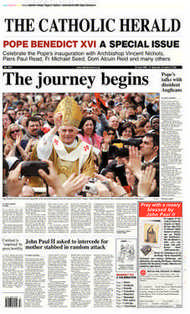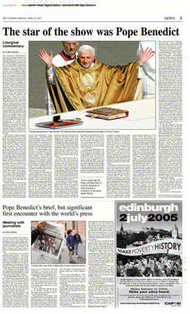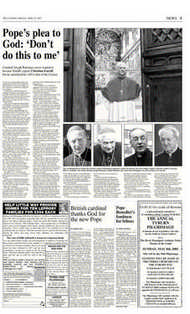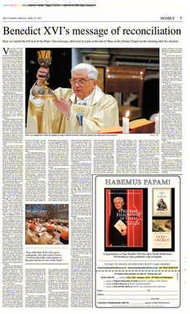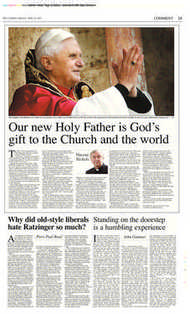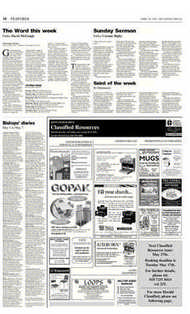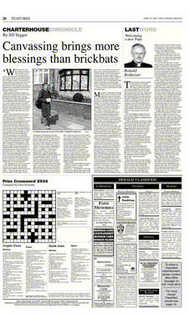Page 5, 29th April 2005
Page 5

Report an error
Noticed an error on this page?If you've noticed an error in this article please click here to report it.
Tags
Share
Related articles
Pope Battles On In Spite Of Widespread Speculation Over...
Pope Benedict Reminds The Jesuits Of Their 'special' Vow...
`why, Lord, Did You Remain Silent? How Could You Tolerate...
Papal Plea To Rebel Lefebvre Published In Unprecedented...
Cardinal Claims That Benedict 'rigged' Conclave
Pope’s plea to God: ‘Don’t do this to me’
Cardinal Joseph Ratzinger never wanted to become Pontiff, reports Christina Farrell, but he submitted his will to that of the Creator THE NEWLY-elected Holy Father has admitted he prayed to God not to be elected Pope as successive ballots in the conclave revealed the strength of his candidacy.
Speaking at a jubilant General Audience in Rome on Monday morning Pope Benedict XVI appeared visibly relaxed after the physical and emotional strain of the funeral of John Paul, the papal election and the inauguration.
Arriving 20 minutes late he joked with pilgrims at his lack of Germanic punctuality, and admitted that he had become “a bit of an Italian”.
As Cardinal Joseph Ratzinger he had begged John Paul II to allow him to retire at 75 but was told he was too important to let go. Now at 78, the new Pontiff recalled the moment in the conclave when he realised he would be elected to the See of Peter. He told his largely German audience that he did not consider himself worthy of the task.
“As, slowly, the balloting showed me that, so to speak, the guillotine would fall on me, I got quite dizzy. I had thought I had done my life’s work and could now hope for a peaceful end of my days,” he said.
“So with deep conviction, I told the Lord: ‘Don’t do this to me! You have younger and better men who can do this work with a very different verve and strength.’ In this situation... the Lord clearly did not listen to me.” Pope Benedict said another cardinal had reminded him of his homily at John Paul’s funeral which recalled Our Lord’s words to the apostle Peter – the first Pope – to follow him.
“My fellow brother wrote me: ‘If the Lord should now tell you, “Follow me,” then remember what you preached. Do not refuse. Be obedient...’ This touched my heart. The ways of the Lord are not comfortable, but we were not created for comfort, but for greatness, for good.” He added: “So, in the end, all I could do was say yes. I am trusting in God, and I am trusting in you, dear friends.” In the weeks following John Paul’s death, Vatican watchers had ignored the bookmakers’ forecasts insisting, “he who goes into the conclave a pope, comes out a cardinal”.
For once, the betting men and not the pundits had anticipated the result correctly and it was Cardinal Ratzinger, the clear favourite, who walked out on to the balcony of St Peter’s Basilica to the gasps and applause of the faithful gathered in the square below.
What happens in a conclave is supposed to be secret, and Vatican officials went to great lengths to ensure the privacy of the prelates during the proceedings.
But, as one commentator put it, total secrecy meant rather less to some cardinals than others and with the words, “Habemus Papam” – we have a pope – some broke their silence.
Prior to the conclave the cardinals had voted unanimously not to speak to the press, a decision described by Vatican spokesman Joaquin Navarro-Valls as “an act of responsibility”.
However, the self-imposed silence only served to inflame rather than stifle debate as media organisations deliberated over the possible voting patterns and attempted to bolster their continuous news update with in-depth analysis. Italian newspapers reported early on that Cardinal Ratzinger entered the conclave with 30-40 of the votes secured.
Opinion on the outcome was split. These, overwhelmingly, were John Paul’s men – he had appointed all but two of the cardinal-electors, one of whom was Cardinal Ratzinger – and a strong conservative vote seemed likely, in keeping with the late Pope’s pontificate.
This was also the most international conclave in history, with 53 nations represented. Even strong Ratzinger supporters felt it unlikely that he would be elected; the head of the Congregation for the Doctrine of the Faith was seen as the kingmaker rather than the king.
What is clear is that the cardinals were reluctant to appear divided, and a “quick” conclave was expected. No conclave in the last 200 years has lasted more than five days but the vote, when it came late on the Tuesday afternoon, a little more than 24 hours after the start of proceedings, still came as a surprise.
It has now emerged that, from the first vote, Cardinal Ratzinger’s name was always to the fore. Cardinals who broke their vow of silence confirmed that the first ballot on the evening of Monday April 18 saw the German cardinal with 40 votes while Carlo Maria Martini, the Italian liberal frontrunner, secured more than 30. The remaining votes were split between a number of candidates, predominantly the two key Latin American cardinals, Jorge Mario Bergoglio of Buenos Aires, Argentina and Claudio Hummes of Sao Paulo, Brazil. Cardinal Martini suffers from Parkinson’s disease and it is believed that he urged his supporters to back the other leading candidate, the self-effacing Cardinal Bergoglio, a Jesuit like himself.
An advocate for the poor, Cardinal Bergoglio has championed social programmes, yet his conservative leanings on doctrinal and spiritual issues were widely seen as being in keeping with the legacy of Pope John Paul II.
If chosen, Bergoglio would have become the first Jesuit pontiff in history.
Tuesday morning’s ballot saw Cardinals Ratzinger and Bergoglio with an increased share of the vote Cardinal Ratzinger reportedly won more than 50 and Cardinal Bergoglio more than 40. But in the fourth and deciding ballot, it was Cardinal Ratzinger who secured more than the crucial two-thirds majority of 77.
The cardinals had not been panicked into a decision, neither was debate absent from the conclave. Cardinal Ratzinger’s stellar performance during the interregnum appears to have persuaded even the most liberalminded of prelates that he was the obvious and the only choice.
For a man who has presided in the curia for over two decades he also revealed himself to have a command of pastoral issues.
As one cardinal suggested, he was seen as being “in the curia, but not of the curia”.
In addition, the cardinals wanted a pope who would tackle the relativistic, secular culture that dominates the west. Cardinal Francis George of Chicago summed up the mood: “In 1978, when Karol Wojtyla was elected as Pope John Paul II, the primary challenge to the Church came from the east in the form of Soviet Communism,” he said.
“Today, the most difficult challenges come from the west and Benedict XVI is a man who comes from the west, who understands the history and the culture of the west.” The conclave had done its job.
blog comments powered by Disqus


